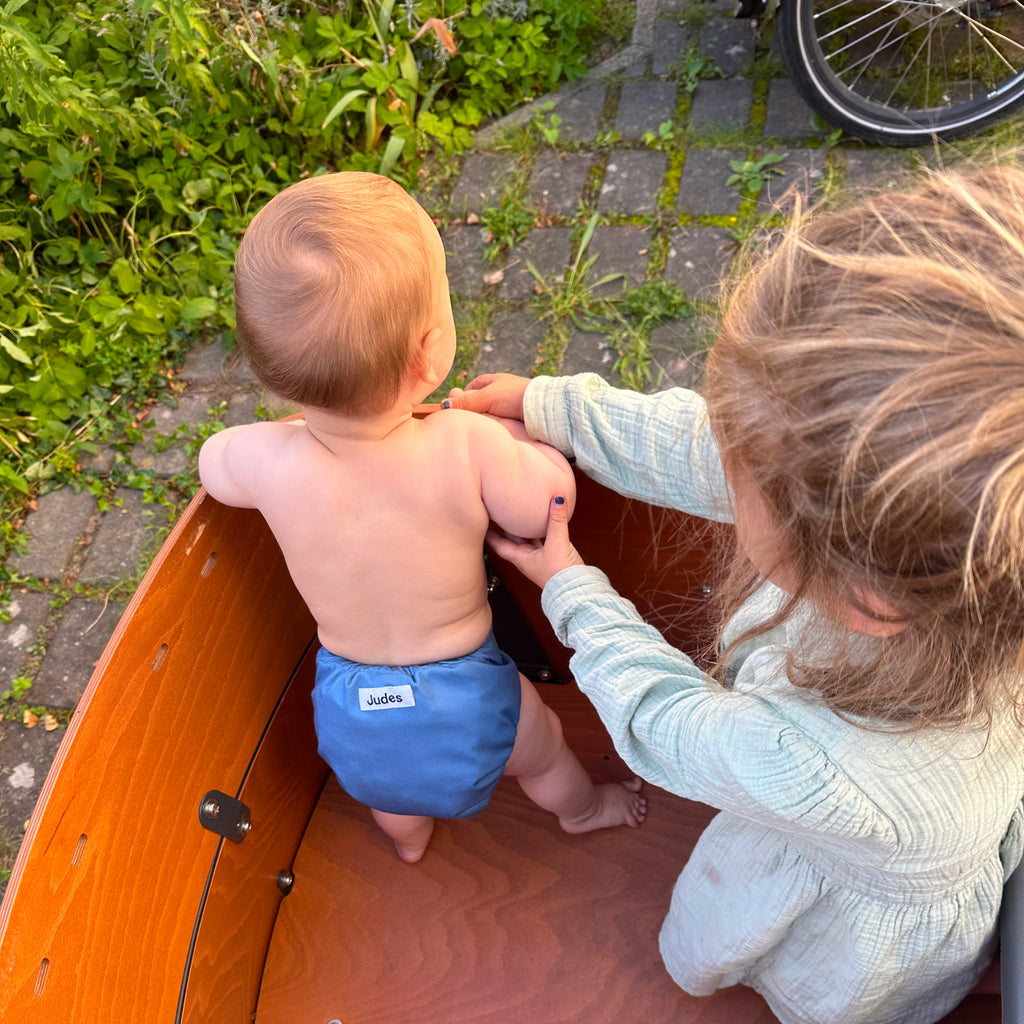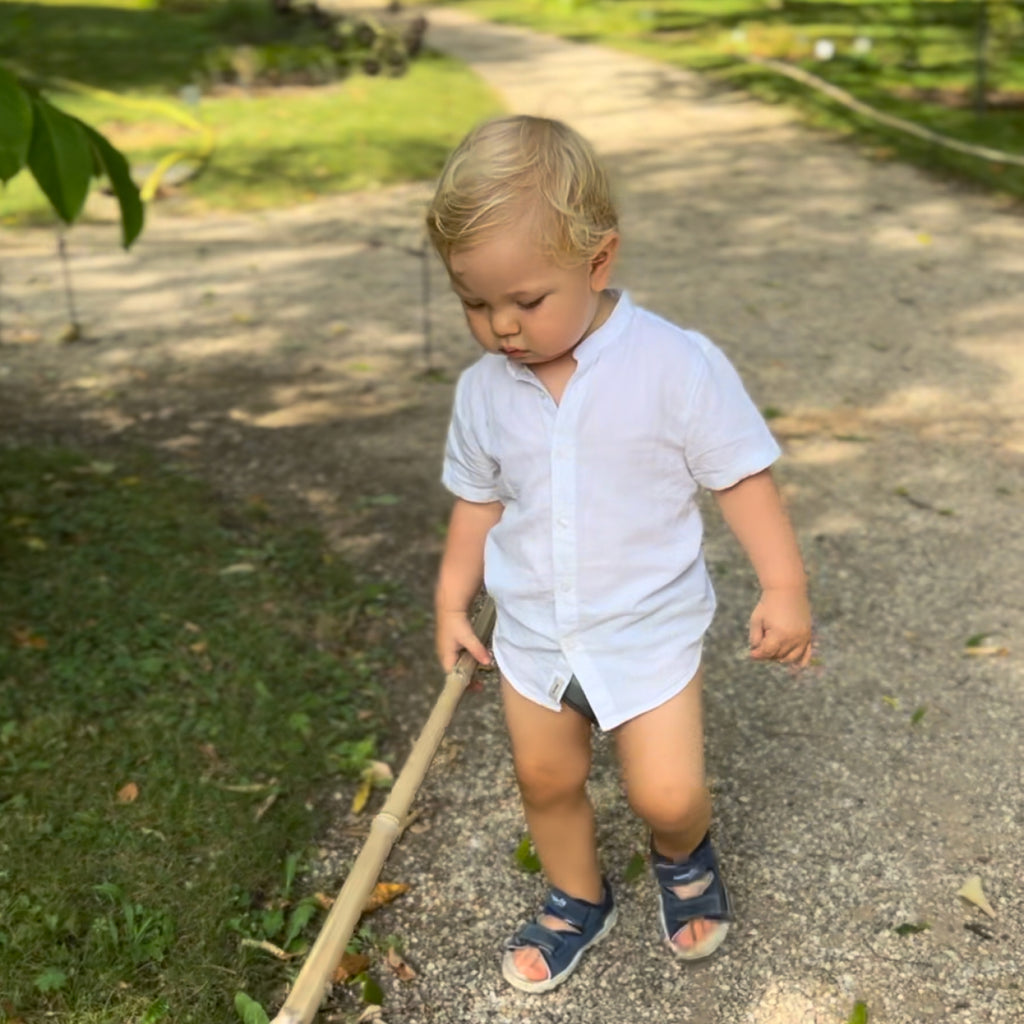Practical Tips for Sustainable and Mindful Parenting
Updated on:
Photo by @jasminstadlhofer
Our daily lives are increasingly shaped by environmental problems and social challenges, making conscious parenthood ever more important. It's about instilling values like mindfulness, responsibility, and respect for nature in children. But how can you, as a parent, implement these values in a hectic daily life and set an example of sustainable behavior for your children?
How does sustainable and conscious parenting work? Sustainable and conscious parenting begins with your own behavior as a parent. Children learn the most through observation and imitation. Therefore, it is important that you as a parent make deliberate decisions that reflect environmental awareness and sustainability.
This includes establishing environmentally-friendly practices in the household, reflecting on your own consumption, and introducing children to the significance and beauty of nature. It also means giving children the freedom to discover the world in their own way and supporting them in thinking critically and making independent decisions.
Sustainability in Parenting: Parents as Role Models
The psychology behind parents being role models is based on the principle of social learning. Children observe their parents and often subconsciously adopt their behaviors, attitudes, and values. Therefore, when parents demonstrate sustainable practices such as recycling, resource conservation, or purchasing eco-friendly products, it is highly likely that their children will view these behaviors as positive and adopt them as well. An equally important component is effective communication: Open discussions about environmental topics and clear explanations for the decisions you make will strengthen your children's awareness of the environment.
The example set by parents in sustainable upbringing is invaluable. It lays the foundation for the environmental ethics and social awareness of the next generation. Children who grow up in an environmentally-conscious household develop a deeper appreciation for nature and a better understanding of how their actions impact the world. This formative experience is crucial as it leads to lifelong habits that can positively influence both individual well-being and that of society as a whole.

Photo by @cafema.illustration
How do children learn to engage with nature consciously?
The relationship between children and nature is fundamental to their development and understanding of the world. Children who learn from an early age to respect and protect nature develop a deep environmental awareness that shapes their entire lives. But how exactly do children learn to appreciate nature and engage with it consciously? The key lies in experience, education, and the example set by the parents.
Integrating sustainability into everyday life from the start
Integrating sustainability into everyday life often begins with small but meaningful steps. Here are some ways to achieve this:
- Choose eco-friendly products: Opt for products that are produced in an environmentally-friendly and sustainable manner. This can range from organic foods to clothing made from natural materials to eco-friendly cleaning products.
- Save energy and resources: Teach children to save energy and resources, for example by turning off lights when leaving a room or using water sparingly. These simple habits contribute to more conscious use of resources.
- Practice recycling and upcycling: Show children how recycling and upcycling can reduce waste. Working together on projects where something new is created from old materials can be both educational and entertaining.
- Encourage nature experiences: Spend time with your children in nature to introduce them to the beauty and importance of the environment. Walks in the forest, visits to parks, or gardening together are excellent ways to get children excited about nature.
- Education and information: Use books, games, and educational materials to playfully convey knowledge about environmental protection and sustainability to children.
By integrating these practices into everyday life, parents can help their children develop a profound understanding and genuine appreciation for the environment.
Environmentally Conscious Parenting by Age
Environmental awareness can and should be fostered at any age, with the approach adjusted according to the child's age group:
- For Toddlers (0–3 years): At this age, fostering a fundamental understanding and love for the environment through direct contact with nature is particularly effective. Simple activities such as playing outside, exploring plants and animals, or feeling various natural materials can be helpful here.
- Preschool Age (4–6 years): Children at this age are very curious and receptive. It's a good time to introduce them to simple concepts like recycling, saving water, and animal protection. Children's books and educational games on environmental protection are ideal tools for this.
- School Age (7–12 years): At this age, children can begin to understand more complex topics such as climate change, ecosystem preservation, and the importance of sustainable consumption. Projects like creating a small garden, participating in local environmental action, or keeping a recycling journal can further enhance interest and awareness.
- Teenagers (13 years and older): During the teenage years, adolescents can actively participate in decisions about eco-friendly products and practices. At this stage, it is particularly effective to engage in discussions about global environmental issues, participate in workshops or join environmental groups, and promote responsible actions.
By using age-appropriate environmentally conscious parenting techniques, you support your child in developing a profound understanding of environmental protection and fostering a long-term commitment to it.
Eco-Friendly from the Start – Cloth Diapers by Judes
So far we have considered various ways to teach children environmentally conscious behavior, but it is equally important to take practical steps in our own daily lives. An essential aspect during the baby phase is the choice of diapers. This is an excellent opportunity to practice sustainability directly: by choosing cloth diapers.
Judes: Comfort and Environmental Protection Combined
Judes is an innovative company that aims to make diapering easier, more environmentally friendly, and stylish. Founded from our own experience and the desire to create a better future for our child and the environment, we developed a cloth diaper with Judes that meets all the needs of modern parents.
Judes are a prime example of how functionality, style, and sustainability can go hand in hand. They are not only easy to use and maintain, but are also made from high-quality, eco-friendly materials. The design of the diapers combines comfort for the baby with practicality for the parents.
Instead of complicated systems and tedious folding inserts, we make it simple for you with Judes. Our washable diapers consist of two parts – an absorbent inner diaper and a waterproof cover. You can get through the entire diapering phase with just two sizes – from birth onwards.
A Contribution to Environmental Protection
By choosing cloth diapers from Judes, parents make a valuable contribution to environmental protection. Unlike disposable diapers, which produce tons of waste and often contain harmful chemicals, cloth diapers are a sustainable alternative that protects the environment while also promoting the baby's health.
Our Judes parents are also convinced:
"We are satisfied with our Judes and save a lot of waste. I can only recommend them."
(Marco Strohmeier)
"I really enjoy diapering my now 3-month-old child with Judes. They hold well, are easy to use. You can save so much waste, and they are also pretty!"
(Pia Haid)
"Judes are super easy to use. Both putting on the diapers and washing and drying are totally straightforward. We have never had a leak with Judes. Also, the diaper pack is not that big and almost comparable to disposable diapers. Furthermore, you save an extreme amount of waste and time. And the best part, the designs are really beautiful."
(Anonymous)
With Judes, parents not only choose an eco-friendly solution, but also support a family business that works with passion and commitment for a greener future.

Photo by @jasminstadlhofer
Conclusion: Sustainability in Parenting – A Comprehensive Lifestyle
The journey through the different facets of conscious and sustainable parenting shows that sustainability is far more than just a term – it is a comprehensive lifestyle. It is not only about long-term decisions, such as the choice of diapers or incorporating environmentally-friendly furniture in the children's room. It is also about the small daily decisions that collectively make a big difference.
Every purchase you make, whether for food, clothing, or toys, every habit, such as saving energy at home or promoting eco-friendly transportation, and every educational measure that sharpens environmental awareness contributes significantly to a sustainable lifestyle. Conscious parenting means being attentive in all areas of life and making decisions that not only benefit your own child's well-being but also preserve and protect the world in which they grow up.
Using products like Judes cloth diapers is an example of how practical sustainability can be integrated into everyday life. It demonstrates that environmentally conscious actions and caring parenting go hand in hand and that through conscious decisions, a positive change for the environment and the next generation can be achieved.
Ultimately, conscious parenting is an ongoing process of learning, adapting, and growing. It is a journey that positively influences not only the future of our children but also that of our planet. Through conscious decisions and actions, we can create a more sustainable, healthier, and fairer world for everyone.

